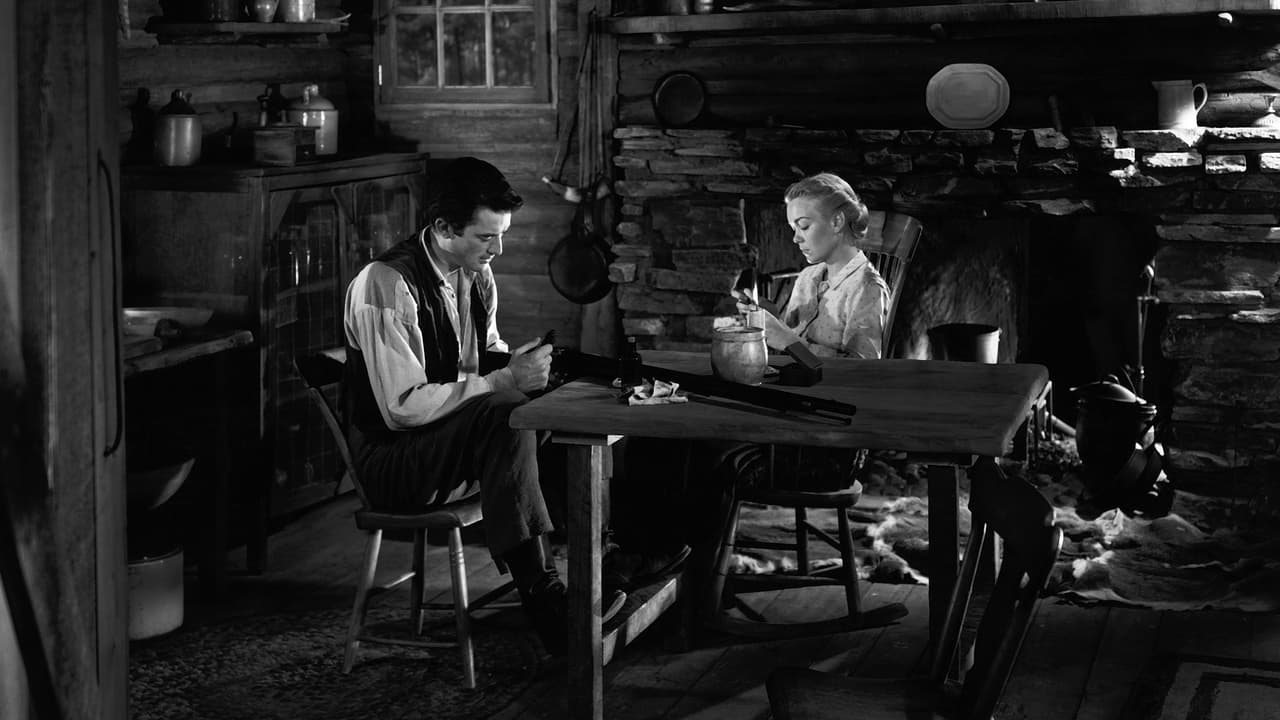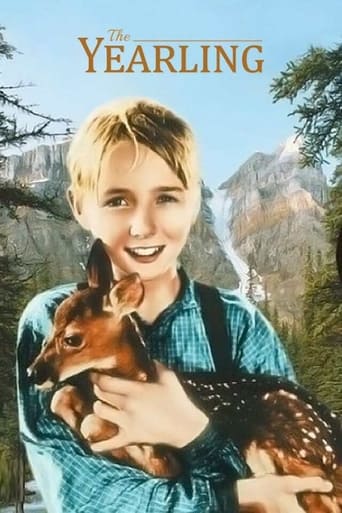

Once a Confederate soldier, Penny Baxter (Gregory Peck) settled on a farm in Florida with his wife Ora (Jane Wyman) in 1878. Their 11 year old son Jody lives an idyllic life except for his hard pessimistic mother. Ora is still haunted by the death of her three other children. Jody wants a pet but Ora refuses. When a rattlesnake bites Penny, they kill a doe and use its organs to draw out the poison. Jody adopts the doe's orphaned fawn with Penny's insistence. Jody's sickly friend Fodderwing dies and he names it Flag for him. Flag grows quickly destroying the crops. Penny tells Jody to take Flag out and shoot it.This is old fashion sentimentality. It's about pioneering heroics and a coming-of-age story. Peck is the solidly superior man. Wyman is the troubled wife. All the "Pa"s from Jody do get a little tiresome. It's every other word from that kid. The Technicolor in the Florida woods looks beautiful. There are some amazing wildlife scenes. They can't make dogs fight a bear anymore. Some have called it a tear jerker. It's a little too broadly sentimental for that. I kept thinking that the deer should probably be tie down at night. This is a movie of a certain time.
... View MoreYes, this is a story of coming of age, maturity and the realization that your childhood may be over; with these great themes, I was very much disappointed with this 1946 film.Claude Jarman Jr. was constantly whining here. I also got tired of the constant "paw," "maw," etc. After a while, I expected a backdrop of the Kentucky back woods.The film was a departure for Jane Wyman in her usual sympathetic roles. Here, she was an embittered woman. Frontier life was apparently too much for her. She is also quite nasty; unlike Gregory Peck, who does so well in his usual understanding roles.How about taking the deer and going far away with it? You knew it was going to follow you.Obviously, Jarman realizes that his childhood is over in the film. He could have met up with Jean Brodie; after all, her prime was done for as well.
... View MoreThis family lives in the near-swamp country of 1870 Florida -- Gregory Peck as the stolid, humane pater familias, Jane Wyman as his hard-working wife, a little grim maybe, and Claude Jarman Jr. as their blond, pudding-faced son who finds a tiny fawn and brings it home to raise. The deer, like most animals, gets less cute as he grows up and starts to destroy the family's little plot of corn, which must last them through the winter.Jarmon tries to take the deer into the woods and lose it but like cats, like dogs, like my ex wife, no matter how far away you take them or how often, no matter how desperate you are to get rid of them, they always find their way home. The deer, Flagg, finally suffers the fate of so many prey animals, an event in which Jarman is coincidentally instrumental.What's striking about the movie, aside from the story, is the photography and set dressing. Man, this looks like it could be post-Civil-War Florida. The hardy and religious folk talk a kinda patois from the rural end of the folk-urban continuum. "He ain't hurt nobody none." "Ya got ta put him out of his torment." "Lord, why did my boy grow up so crookedly?" It's easy to look at -- what with its swamps and palmettos and blackwater creeks -- and fun to listen to.The acting is Hollywood professional. Peck's family may be marginal, living on hard work and hopes, their clothes slowly devolving into washrags, but he's always clean shaven and handsome. They went to some effort to deglamorize Jane Wyman. And Jarman Jr. pulls off his role with enthusiasm and at least a modicum of skill. None of the performances is outstanding but none is a disaster. Clarence Brown's direction is functional and lacking in poetry. It gets the job done without being in any way imaginative. When Peck sits on his son's bed and reminisces and fantasizes about his dreams, he stares at the wall. During a long monologue that's all he does. He doesn't blink. He doesn't glance down at his son's face. His gaze doesn't drift. He stares at the same space, as a painted portrait might.And when poor little Claude Jarman Jr. hears a shot and realizes that Flagg has (sob) been wounded and -- and -- pardon me -- that he must be dispatched with another shot, sob, administered by the very boy who LOVES HIM, why -- excuse me -- there won't be no dry eye in the house.I don't think they could make anything like this again. Our sensibilities have become too coarsened. We'd have to see the deer's skull shattered by a dozen shotgun pellets, the blood and brain tissue spattering the kid's horrified face. Maybe in slow motion. And then, Maw and Paw, being the practical people they are, would have to force Jarmon Jr. to EAT the animal he raised and adored. "Cain't have no food going' to no waste round here, Son, tough as it may be -- the situation that is, not the meat, cause you got to admit that venison's a mite tasty. Here, try a eyeball. Do you a power of good. Now stop that snifflin', Son. Ain't no need for no snifflin'. Just for double and triple negatives." I never read Marjorie Kinnan Rawlings novel. If it's as evocative of a given lifetyle at a given period as the film is, it might be rather good.
... View MoreI'm probably going to engender a lot of hate for my opinion on this one. I know it's one of the most beloved children's films of all time, but I found it terribly mawkish and boring. Most of my dislike for the film comes from the central performance of Claude Jarman Jr. I hate to say that, because I think he's fantastic in the cinematic adaptation of Faulkner's Intruder in the Dust, and he's perfectly good in John Ford's Rio Grande, too. But, as a 12 year-old actor in The Yearling, he comes off as functionally retarded. I'm guessing the kid in the original novel was younger than 12, but this kid doesn't look any younger than 12, and no 12 year-old kid should be this stupid, pioneer times or not. I'm also pretty sure he was having sex with the deer. I mean, look at the kid's face when he first finds it (I wish I had done a screen capture). And later he's sleeping with the deer, and his mom even says he smells like the thing. If I were her, I'd be checking his pubes for ticks. Gregory Peck and Jane Wyman, who play Jarman's parents, come off a lot better (both were nominated for Oscars), but they're saddled with some awful, faux-archaic dialogue. This film holds the records for the most uses of the word "taint" outside of a gay porno film. And Wyman can come off as an awful bitch sometimes. For good reason, I suppose. I'd be pretty mad that my 12 year-old son was so freaking stupid, too. Jarman's lucky she didn't take him out, too, Lenny-style. By the way, I absolutely love the IMDb trivia bit that says Wyman's real-life daughter wouldn't talk to her for two weeks after she saw the movie. The film also doesn't work for me because I grew up in a place where deer were plentiful - sure, I can enjoy Bambi, but real deer are about the most infuriating animal on the planet. They're vermin. Sure, the baby deer is cute, but as soon as the deer starts eating my corn, I'd turn it into venison tout suite.
... View More